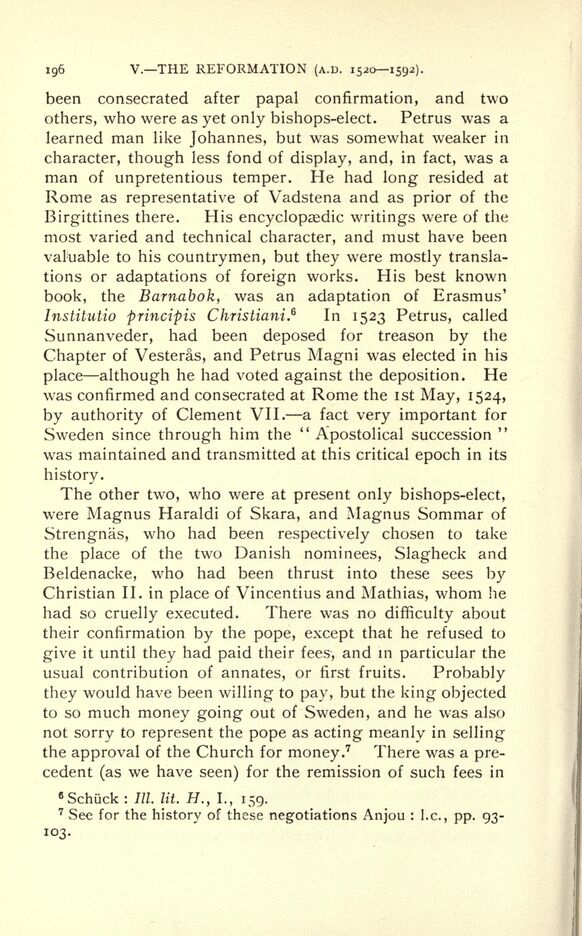
Full resolution (JPEG) - On this page / på denna sida - V. The Swedish Reformation under Gustaf Vasa and his sons Eric and John (1520—1592 A.D.)

<< prev. page << föreg. sida << >> nästa sida >> next page >>
Below is the raw OCR text
from the above scanned image.
Do you see an error? Proofread the page now!
Här nedan syns maskintolkade texten från faksimilbilden ovan.
Ser du något fel? Korrekturläs sidan nu!
This page has never been proofread. / Denna sida har aldrig korrekturlästs.
196 V. THE REFORMATION (A.D. 15201592).
been consecrated after papal confirmation, and two
others, who were as yet only bishops-elect. Petrus was a
learned man like Johannes, but was somewhat weaker in
character, though less fond of display, and, in fact, was a
man of unpretentious temper. He had long resided at
Rome as representative of Vadstena and as prior of the
Birgittines there. His encyclopaedic writings were of the
most varied and technical character, and must have been
valuable to his countrymen, but they were mostly transla
tions or adaptations of foreign works. His best known
book, the Barnabok, was an adaptation of Erasmus
Institutio principis Christian!.6
In 1523 Petrus, called
Sunnanveder, had been deposed for treason by the
Chapter of Vesteras, and Petrus Magni was elected in his
place although he had voted against the deposition. He
was confirmed and consecrated at Rome the ist May, 1524,
by authority of Clement VII. a fact very important for
Sweden since through him the
"
Apostolical succession
"
was maintained and transmitted at this critical epoch in its
history.
The other two, who were at present only bishops-elect,
were Magnus Haraldi of Skara, and Magnus Sommar of
Strengnas, who had been respectively chosen to take
the place of the two Danish nominees, Slagheck and
Beldenacke, who had been thrust into these sees by
Christian II. in place of Vincentius and Mathias, whom he
had so cruelly executed. There was no difficulty about
their confirmation by the pope, except that he refused to
give it until they had paid their fees, and in particular the
usual contribution of annates, or first fruits. Probably
they would have been willing to pay, but the king objected
to so much money going out of Sweden, and he was also
not sorry to represent the pope as acting meanly in selling
the approval of the Church for money.
7
There was a pre
cedent (as we have seen) for the remission of such fees in
6
Schuck: ///. lit. H., I., 159.
7
See for the history of these negotiations Anjou :
I.e., pp. 93-
103.
<< prev. page << föreg. sida << >> nästa sida >> next page >>